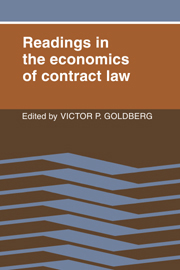Book contents
- Frontmatter
- Contents
- Preface
- Readings in the economics of contract law
- Part I Some preliminaries
- Part II Contract law and the least cost avoider
- Part III The expectation interest, the reliance interest, and consequential damages
- Part IV The lost-volume seller puzzle
- Part V Specific performance and the cost of completion
- 5.1 The choice of remedy for breach of contract
- 5.2 Relational exchange, contract law, and the Boomer problem (2)
- 5.3 Cost of completion or diminution in market value: the relevance of subjective value
- Questions and notes on specific performance and cost of completion
- Part VI Power, governance, and the penalty clause puzzle
- Part VII Standard forms and warranties
- Part VIII Duress, preexisting duty, and good faith modification
- Part IX Impossibility, related doctrines, and price adjustment
- Questions and notes on impossibility and price adjustment
- References
- Index of cases
- Author index
- Subject index
5.3 - Cost of completion or diminution in market value: the relevance of subjective value
Published online by Cambridge University Press: 10 November 2010
- Frontmatter
- Contents
- Preface
- Readings in the economics of contract law
- Part I Some preliminaries
- Part II Contract law and the least cost avoider
- Part III The expectation interest, the reliance interest, and consequential damages
- Part IV The lost-volume seller puzzle
- Part V Specific performance and the cost of completion
- 5.1 The choice of remedy for breach of contract
- 5.2 Relational exchange, contract law, and the Boomer problem (2)
- 5.3 Cost of completion or diminution in market value: the relevance of subjective value
- Questions and notes on specific performance and cost of completion
- Part VI Power, governance, and the penalty clause puzzle
- Part VII Standard forms and warranties
- Part VIII Duress, preexisting duty, and good faith modification
- Part IX Impossibility, related doctrines, and price adjustment
- Questions and notes on impossibility and price adjustment
- References
- Index of cases
- Author index
- Subject index
Summary
In contract cases – typically construction or mining cases – courts frequently measure the damages of the innocent party either by the diminution in the market value at the time of breach from less than perfect performance or by the cost of rendering performance perfect. The diminution measure is objective; that is, observers external to the contract, such as the judge or jury in a lawsuit, can ascertain its amount with reasonable accuracy at a tolerable cost. Yet this objective measure can undercompensate the aggrieved party, thereby contradicting contract law's principle that damages should place the injured party in the same position as if the contract were performed. For example, consider construction of a family dwelling that deviates from the contract specifications by changing the location and size of some of the rooms while leaving the total square footage of the house unchanged. This breach need not diminish market value: Preferences for housing style vary considerably, and the builder might simply sell the house to another buyer at the price the original purchasing party had offered. Nevertheless, the original purchaser may value the house promised more highly than the house actually delivered. Because market value did not decrease, there is no damage by the objective measure. Nevertheless, damage does exist, albeit of a nonpecuniary or subjective nature.
Any decision to ignore subjective value cannot rest on the ground that such damages are either unreal or frivolous – this argument is patently false. Instead, the decision must rest on more prudential considerations, namely, that the costs of determining subjective value exceed any allocative benefits that the determination might yield.
- Type
- Chapter
- Information
- Readings in the Economics of Contract Law , pp. 128 - 132Publisher: Cambridge University PressPrint publication year: 1982



